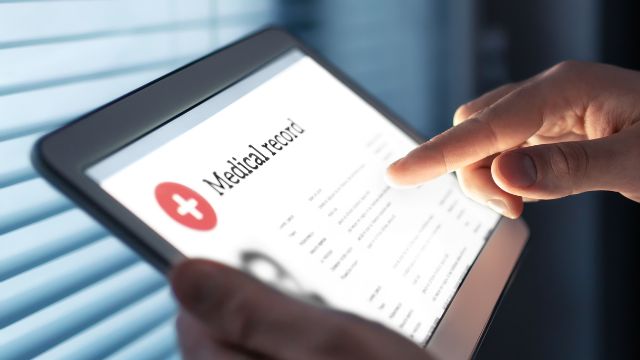Digital Health in India: Its Future, Challenges, & Benefits!
Do you realise you are living in an exciting time? Technology and healthcare are collaborating to transform how you access and receive medical services. India's healthcare industry has also embraced technology. The results are visible through telemedicine, health applications, and improved healthcare quality and accessibility.
To make digital healthcare in India more effective there are different PHR apps which play pivotal role by empowering individuals to have secure, convenient access to their comprehensive medical history, promoting better care coordination, informed decision-making, and enhanced patient-provider collaboration.

Since digital health care is still a new kid on the block, you might have many questions about it. This blog tries to answer most of them. Keep reading to get enlightened about the future of the healthcare sector in India.
What is the Definition of Digital Health?
The use of digital technology, such as mobile applications, telemedicine, wearable devices, and electronic health records, to enhance healthcare delivery and patient outcomes is referred to as digital health.
What is the Purpose of the National Digital Health Mission?
The National Digital Health Mission (NDHM) is the government of India's ambitious endeavour to develop a state-wide digital health ecosystem. Its primary goal is to offer each Indian citizen a unique health ID containing their medical history, records, and other health-related information.
The purpose is to promote access to excellent healthcare for all people by streamlining healthcare services and lowering healthcare costs.
Who are the Key Stakeholders in India's Digital Healthcare Sector?
In India, several stakeholders play important roles in shaping the industry, including the following:-
- Government: The government plays a crucial role in setting policies, regulations, and standards for digital health
- Healthcare Providers: Hospitals, clinics, doctors, nurses, and other healthcare professionals are the end-users of digital health technologies and tools. Their involvement is crucial for successfully adopting and implementing digital health initiatives.
- Patients and Citizens: Patients and citizens are the ultimate beneficiaries of digital health. Their active engagement, participation, and trust are vital for the success of digital healthcare initiatives.
- Technology Companies: Technology companies are vital in driving innovation and providing the necessary infrastructure for digital healthcare.
What are The Benefits and Difficulties of Digital Health in India?
Digital health has the potential to revolutionise healthcare in India. But it also comes with a set of benefits and difficulties.
Benefits of Digital Health in India:
- Enhanced Access to Healthcare: Remote consultations, telemedicine, and online health services enabled by digital health technology can bridge the divide between rural and urban healthcare. This can potentially enhance access to healthcare services, particularly for individuals living in distant places.
- Improved Efficiency and Cost Savings: Digital health solutions can help to speed healthcare operations, minimise paperwork, and increase the efficiency of healthcare delivery. This can save money for both patients and healthcare providers.
- Better Patient Outcomes: Digital health tools enable gathering and analysing real-time patient data. This leads to more accurate diagnoses, personalised treatment regimens, and better patient outcomes.
Difficulties of Digital Health in India:
- Infrastructure and Connectivity: There are still internet connection issues in India, particularly in rural regions. This interferes with the successful implementation of digital health programmes.
- Data Privacy and Security: Stringent laws and standards are required to protect patient data and ensure its secure storage and transmission.
- Digital Divide: With a significant percentage of the population lacking digital literacy, India has a considerable digital gap. Bridging this gap is critical to ensuring everyone can access digital health services equally.
In India, What is the Future of Digital Healthcare?
With advancements in technology, increased internet penetration, and growing awareness about digital health, we can expect to see:
- Increased Adoption of Telemedicine: Telemedicine has grown in popularity in recent years, and its use is anticipated to grow much more. Remote consultations, virtual diagnostics, and internet healthcare services will gain popularity.
- AI and Data Analytics in Healthcare: AI and data analytics have the potential to transform healthcare by providing predictive analytics, personalised therapy, and early illness diagnosis.
- Wearable Devices and Remote Monitoring: Wearable devices for health monitoring, such as fitness trackers and smartwatches, will become more prevalent. These devices can track real-time health data. This enables both patients and healthcare to have timely intervention and preventive care.
- Health App Ecosystem: The availability of health-related mobile applications will continue to expand, providing users with easy access to healthcare information, appointment booking, medication reminders, and lifestyle management tools.
To summarise, the status of digital healthcare in India is seeing great development and has significant room for improvement. As smartphone and internet connectivity adoption rises, more individuals are gaining access to healthcare services via digital platforms. This shift has also paved the way for new opportunities in telemedicine, remote consultations, and health monitoring.
There are still obstacles to be conquered. Nonetheless, the GOI and the private sector have enormous potential to alter healthcare in the country. Furthermore, all the stakeholders must continue collaborating to bridge gaps and address difficulties. Let’s utilise the full potential of technology to offer excellent healthcare to all.
Author Bio: Jigar Patel is the Founder of Health-e, a HealthTech app that simplifies health records management along with providing personalized and preventative healthcare solutions. Although he has 20+ years of operations and management experience in the EPC domain, Jigar’s true passion lies in making healthcare simpler, faster, and more accessible for doctors and patients alike. He strongly believes that people need to be empowered to participate in their own healthcare and is constantly thinking of ways to build this into his app. He loves to keep things simple be it in life, product design, his work or the content he develops. Being married for 10 years and having 2 kids have taught him that perspective matters, so you can always count on him to share new perspectives on various topics.
